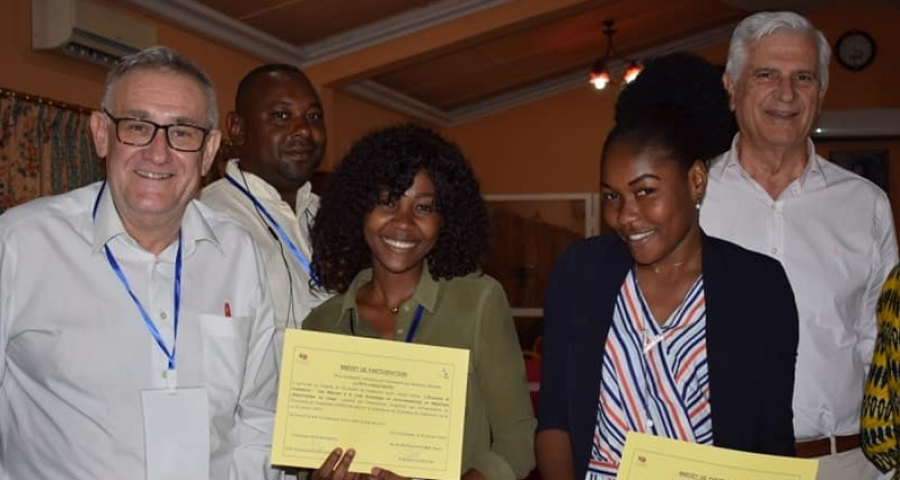Travel log and meetings on the side lines of the 1st National Congress of Entrepreneurs of the Economy of Communion held in Kinshasa from January 16 to 18
By Benedetto Gui
The very wide road that leads from the airport to Kinshasa is crowded with cars, SUVs and vans of all models, sizes and conditions. The yellow colour prevails, among the innumerable private vehicles (even three wheelers, and then there are the countless motorcycles) that carry out passenger transport, in the almost complete absence of public transport.
Although it is late in the evening, the two land strips on either side of the road bustle with a series of activities, with makeshift support and without leaving much free space, ranging from the sale of 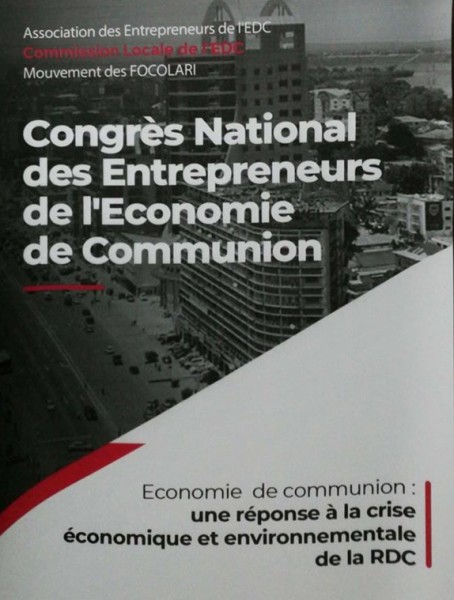 all kinds of merchandise to the preparation of food and the provision of on-the-road-services to a fraction of the 15 million inhabitants of this capital of sub-Saharan Africa. Between the passing cars and in the traffic divider area you can barely see the dark shadows of large and small pedestrians who, in the absence of any traffic lights, look for the right moment to cross the large artery. It distresses me. If the leaders who cared the most about the well-being of ordinary people had not been murdered since the days of independence until today – they will tell us more about this later - perhaps today things would be different. Since traffic slows down to almost a full stop in a series of bottlings caused by the construction sites that have been on hold for months, our kind driver tells us about when he participated in the workshop for young African "start uppers" held in Fontem in 2017. He studied computer science and is able to practice his profession together with some colleagues, albeit informally. This he does during the day, because at night he turns to his other small business activity, a bakery that has to have the "baguettes" ready by four o'clock in the morning, in time for the street vendors who live in the neighbourhood, to fill and load the large plastic basins on their heads with which they then supply their sales stalls scattered throughout the city. That workshop - he tells us - gave a nice boost to almost all his countrymen who participated, some of them complete beginners, others owners of already active business which they needed to consolidate.
all kinds of merchandise to the preparation of food and the provision of on-the-road-services to a fraction of the 15 million inhabitants of this capital of sub-Saharan Africa. Between the passing cars and in the traffic divider area you can barely see the dark shadows of large and small pedestrians who, in the absence of any traffic lights, look for the right moment to cross the large artery. It distresses me. If the leaders who cared the most about the well-being of ordinary people had not been murdered since the days of independence until today – they will tell us more about this later - perhaps today things would be different. Since traffic slows down to almost a full stop in a series of bottlings caused by the construction sites that have been on hold for months, our kind driver tells us about when he participated in the workshop for young African "start uppers" held in Fontem in 2017. He studied computer science and is able to practice his profession together with some colleagues, albeit informally. This he does during the day, because at night he turns to his other small business activity, a bakery that has to have the "baguettes" ready by four o'clock in the morning, in time for the street vendors who live in the neighbourhood, to fill and load the large plastic basins on their heads with which they then supply their sales stalls scattered throughout the city. That workshop - he tells us - gave a nice boost to almost all his countrymen who participated, some of them complete beginners, others owners of already active business which they needed to consolidate.
In the following days we would find ourselves in the midst of some sixty conference participants (1st national EoC congress entitled: "Economy of Communion: a response to the economic and environmental crisis of the Democratic Republic of the Congo"). Among them a robust patrol group of promoters (congratulations, for the commitment and for the content, including the academic content!) And a very nice team of young people, who have rolled up their sleeves and already carry their small and large share of responsibility in the development of the economy. The proposal they receive here is 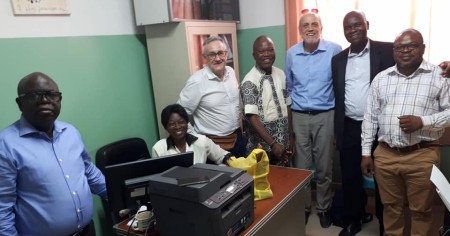 that of an enterprising economy, (and there is a great need to go beyond mere street level micro-activities), which is attentive to the dignity of people and ready to share (as much as necessary!), while also being "disciplined", in order to overcome general improvisation and the confusion between business expenses and family expenses (two weaknesses that lead many businesses into trouble here). This proposal is supported by the stories and words told by those who have already made their choice: training offered to workers who could very well go and offer it to other companies ("It doesn't matter. Our country still needs these skills"); support for young people who would otherwise have few chances (how many are seen in the streets intent on various small survival activities!); periodic adjustment of wages to price increase to safeguard the purchasing power of families, made by choice of the employer, because contracts usually do not include any compensation for inflation; openness to members of other religious communities or other tribes, which is far from obvious here.
that of an enterprising economy, (and there is a great need to go beyond mere street level micro-activities), which is attentive to the dignity of people and ready to share (as much as necessary!), while also being "disciplined", in order to overcome general improvisation and the confusion between business expenses and family expenses (two weaknesses that lead many businesses into trouble here). This proposal is supported by the stories and words told by those who have already made their choice: training offered to workers who could very well go and offer it to other companies ("It doesn't matter. Our country still needs these skills"); support for young people who would otherwise have few chances (how many are seen in the streets intent on various small survival activities!); periodic adjustment of wages to price increase to safeguard the purchasing power of families, made by choice of the employer, because contracts usually do not include any compensation for inflation; openness to members of other religious communities or other tribes, which is far from obvious here.
“I learned many things I didn't know - a young entrepreneur who installs solar panels, says from the stage - and I carried out others without even knowing what they were called, for 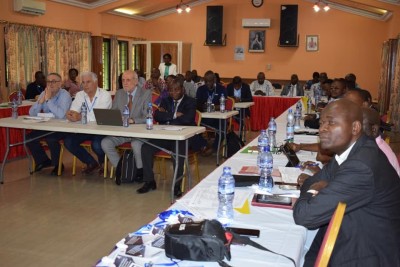 example keeping employees informed in a fully transparent way".
example keeping employees informed in a fully transparent way".
“It’s just what we have been talking about during these last few days, this is how workers must be treated! It's the only way that works!” - says another who has the name of an ancient philosopher whose merits he does not know, but whose wisdom he shares (I would later discover that he has been working for many years, both in his small IT business and on behalf of others, managing more than twenty people).
Among the participants there are also owners of larger companies. We would have the opportunity to visit some of them in the following days, entering some of the other conference alleys (in mud, but in some places almost paved with squashed plastic bottles, or mounted, with deep depressions - sometimes flooded – that you have to ascend and descend). One company operates a medical analysis laboratory (and 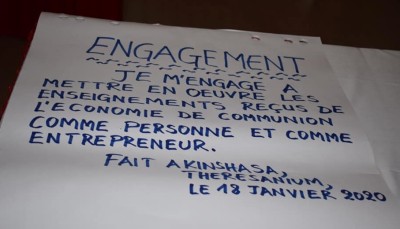 soon a second one in an inland town), with a standard that I did not expect. In addition, it imports and distributes healthcare supplies throughout the country (also to international organizations that operate in the unfortunate East, afflicted for decades by a fierce civil war and now also by the Ebola virus). Another company carries out state-of-the-art construction work in the small and highly expensive building plots of this complicated megacity; so that new houses and buildings tower, above a vast sea of huts and shacks, which we hope will sooner or later grow and consolidate. Another company - still in the consolidation phase - transports agricultural products from the semi-isolated areas of the interior to the city, venturing on shabby streets with two ancient and glorious well-repainted Mercedes trucks; the engines were found in the European second-hand market by the Spanish partners who wanted to give the project a chance; it took a year between permits and shipping to get them there, which should tell us something about the difficulty of doing business at certain latitudes.
soon a second one in an inland town), with a standard that I did not expect. In addition, it imports and distributes healthcare supplies throughout the country (also to international organizations that operate in the unfortunate East, afflicted for decades by a fierce civil war and now also by the Ebola virus). Another company carries out state-of-the-art construction work in the small and highly expensive building plots of this complicated megacity; so that new houses and buildings tower, above a vast sea of huts and shacks, which we hope will sooner or later grow and consolidate. Another company - still in the consolidation phase - transports agricultural products from the semi-isolated areas of the interior to the city, venturing on shabby streets with two ancient and glorious well-repainted Mercedes trucks; the engines were found in the European second-hand market by the Spanish partners who wanted to give the project a chance; it took a year between permits and shipping to get them there, which should tell us something about the difficulty of doing business at certain latitudes.
On our way back to the airport, we manage to escape being stopped by local traffic police, always very able in finding – oh, say a cracked mirror? All the while countless vehicles drive around freely 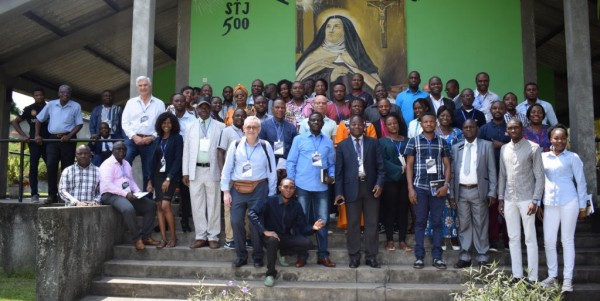 without even basic headlight equipment. But this is enough to be able to negotiate a few dollars out of drivers, dollars that will hardly reach the competent institution, (I say dollars because Congolese francs are used for minor transactions). Instead, we meet a specimen of the infamous traffic police robot (of Congolese design and production) that opens and moves its arms to regulate the chaotic traffic of some intersections.
without even basic headlight equipment. But this is enough to be able to negotiate a few dollars out of drivers, dollars that will hardly reach the competent institution, (I say dollars because Congolese francs are used for minor transactions). Instead, we meet a specimen of the infamous traffic police robot (of Congolese design and production) that opens and moves its arms to regulate the chaotic traffic of some intersections.
I think of this piece of our world community, inhabited by such a poor population despite the country being so rich, not only in natural resources (too many, hence the root of many of its problems), but also in human capital, (if you do not know certain functions of your smartphone, the first young person who passes by here could easily give you a full course in how to reboot it), as well as rich in generosity. Other characteristics, individual and collective, are unfortunately lacking. The Economy of Communion could bring a good healthy dose of them. And also a little light.
![]() Go to photogallery
Go to photogallery

